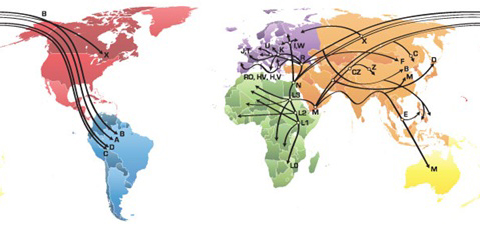Cutting-edge technology
With this advanced and cutting-edge technology, clients can now not only see where their ancient relatives came from but also understand their migrations routes and their ancestry on a genetic level.
Mitochondrial DNA: the power to trace your roots
Mitochondrial DNA or “MtDNA” is a DNA type that is inherited from one generation to the other. But one peculiar characteristic of MtDNA is that is it inherited by both male and female offspring in all mammals but is only passed on by females. Whilst males inherit MtDNA from their mother, they are not able to pass it on to their offspring. Besides this unique matrilineal inheritance pattern, we have hundreds of copies of MtDNA in a human cell. If there are any mutations on one copy, this mutation would indeed be diluted by the other unaffected copies. A maternal lineage test is thus, a very accurate type of test. It is inherited unchanged as generations roll by. So as long as a direct blood maternal line can be traced, all those members of that blood line will have the same MtDNA profile (no matter how distantly they are related).
Genetic research advances have created and classified large groups of people with close genetic information, into what they call “maternal haplogroups”. Anthropologists and geneticists have closely worked with scientists to discover and categorize the geographical origins and genetic populations of our ancestors. These haplogroup studies have helped us understand from where these genetic cousins originated and how they migrated across the globe.
Read how these MtDNA haplogroups spread over the planet HERE.
Find out more about the special properties unique to mitochondrial DNA HERE.

The three haplogroup regions
-
Mitochondrial DNA HVRI (HVR1 stands for Hypervariable Region I): Testing this region is usually sufficient to determine a person’s haplogroups.
-
Mitochondrial DNA HVRII and HVRIII: Testing these two regions can provide more detail if HVSI testing is not sufficient to determine affinity to a haplogroups; it could also further refine a haplogroups into sub-groups, also called sub-clades.
EasyDNA is currently offering our clients their own maternal lineage DNA test for just €159. All Maternal MtDNA tests will incorporate a complete analysis of your unique DNA sequence against the DNA samples from all three of the major regions: HVRI, HVRII, and HVRIII. Your personal DNA test results will be made available to you via email in 4-5 weeks from the date EasyDNA receives your DNA samples at the laboratory.
View a copy of the maternal lineage certificate HERE.
Click here to read A Beginner’s Guide to DNA Ancestry Testing which compares the different types of ancestry DNA tests we offer.
As a special package, we are offering a Dual Lineage Test (maternal and paternal) for the special price of €249, however please note the duo lineage test is only available for male test participants.
The mtDNA DNA test package
-
A DNA kit to collect DNA sample using oral swabs. Samples then need to be returned to be analyzed.
-
Complete description of your matching haplogroups and their designations.
-
Raw MtDNA data from your sample detailing the differences found between your DNA and that of the revised Cambridge Reference Sequence.
-
Information on your “genetic cousins” and your very own haplogroup designation. You can easily identify your ancestor’s locations over time on the planet.
-
Facts about your haplogroups, including which parts of the world you can find your “genetic cousins” and famous people who share the same haplogroups as you do.
Maternal ancestry testing or mitochondrial DNA testing?
When we carry out a maternal lineage ancestry test, we analyze your mitochondrial DNA. This type of ancestry test is not however, the same as our mitochondrial DNA relationship test. The ancestry test is aimed at determining your ancient maternal lineage. If you simple want to find out whether you and another person share a common maternal line, then what you need is an MtDNA test. This test will simply show whether you and the other person or people tested share the same mitochondrial profile and thus, whether they share a common maternal relative (a grandmother, mother and so forth).



 Difference between Autosomal Ancestry Tests and Sex-Chromosome Ancestry Tests
Difference between Autosomal Ancestry Tests and Sex-Chromosome Ancestry Tests